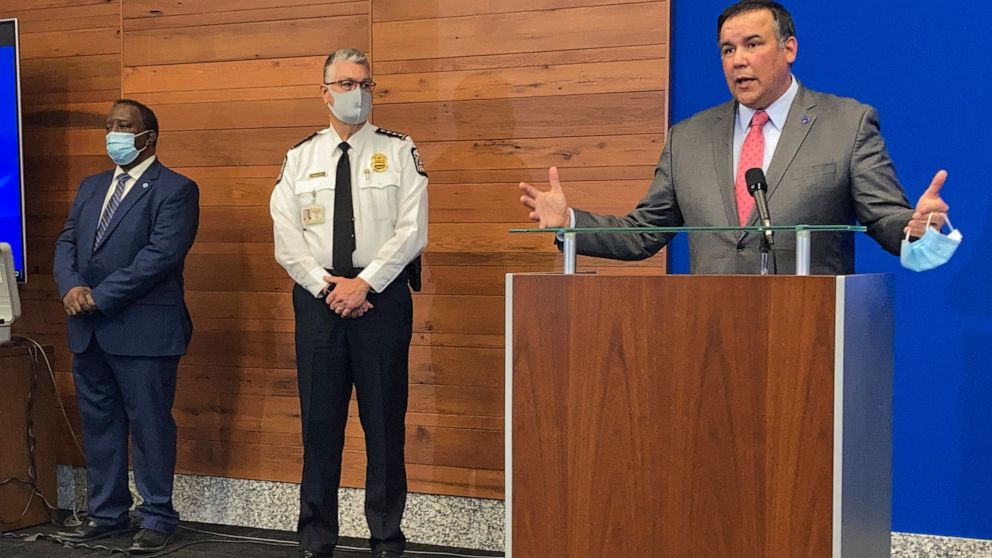
COLUMBUS, Ohio -- The U.S. Justice Department will review practices of the Columbus police department, which has been rocked in recent years by a series of fatal police shootings of Black people and its response to last year's racial injustice protests, the city and the government announced Thursday.
The review will be conducted by the Justice Department's Office of Community Oriented Policing Services and will consist of what the department is calling technical assistance in such areas as training, recruitment including a focus on diversity, technology, and creating an early intervention system for officers.
“This is not about one particular officer, policy or incident," Columbus Mayor Andrew Ginther said in a statement. “Rather, this is about reforming the entire institution of policing in Columbus.”
Unlike other cities under Justice Department review, which is often unwanted, Columbus requested the federal involvement. Ginther and City Attorney Zach Klein asked the government to intervene in April, days after a white officer fatally shot 16-year-old Ma'Khia Bryant while the teenager, who was Black, was swinging a knife at a woman.
The COPS Office has a track record of providing an array of resources for police departments, said Robert Chapman, acting COPS director.
“Reinforcing the key tenets of community policing — partnerships, the use of problem-solving to address crime systematically, and transforming both organizations and their people — will result not only in more effective law enforcement, but also in communities that are safer and stronger,” he said in a statement.
Ginther and the all-Democratic city council pushed for multiple changes to the Columbus Division of Police over the years, including the creation — approved by voters in November — of the city's first civilian police review board and the selection in June of Elaine Bryant as police chief, the first Black woman to serve in that role.
But Ginther said in April, when he requested a Justice Department review, that the city needs additional help because of “fierce opposition” to reform within the agency.
Criticism has included not just fatal police shootings, but also the department’s reaction to protests over racial injustice and police brutality following the death of George Floyd at the hands of Minneapolis police Officer Derek Chauvin. A report commissioned by the Columbus City Council and released in April criticized both the police department and city leaders, saying Columbus was unprepared for the size and energy of the protests.
Thursday's announcement was criticized almost immediately by some advocates for deeper reform within the agency. Ginther should have requested a review known as a “pattern and practices investigation," which would carry with it the possibility of court-ordered oversight, said Sean Walton, an attorney who has represented the families of several Black people fatally shot by Columbus police.
Accepting a review by the community policing office was an intentional attempt to ignore the Columbus department's "abusive history in an effort to avoid a negative national spotlight coming to Columbus," said Walton, speaking on behalf of the Columbus Police Accountability Project. He called Ginther's decision “a slap in the face to the people he claims to serve, and is yet another frustrating example of politics as usual in Columbus.”
In 2016, shortly after Ginther took office, the city spent millions of dollars to buy police body cameras for the first time and is now in the process of spending millions more to upgrade them.
Even with that and other initiatives, Columbus — the country’s 14th largest city — has recorded a number of contested police shootings.
The most recent cases include the death of Bryant; the April 12 killing of 27-year-old Miles Jackson in an emergency room; and 47-year-old Andre Hill. The white police officer who fatally shot Hill on Dec. 22 has pleaded not guilty to a number of charges made against him by the state attorney general’s office.
In January, interim Chief Thomas Quinlan was forced out after Ginther said he had lost confidence in the chief’s ability to make needed changes to the department.
Before the recent police shootings, the city was sued over the 2016 shooting of Henry Green, a Black man, by two undercover white police officers working in an anti-crime summer initiative.
Later in the same year, a white officer fatally shot 13-year-old Tyre King, who was Black, during a robbery investigation.
Records show that Black residents, about 28% of the Columbus population, accounted for about half of all uses of police force from 2015 through 2019.
The agency — like many big-city departments — is juggling calls for internal change even as it battles street violence. Columbus saw a record 174 homicides in 2020 and has recorded 143 so far this year, a figure not reached until mid-November last year.
In 1999, the Justice Department sued the city, accusing officers of routinely violating people’s civil rights through illegal searches, false arrests and excessive force. A year later, the government added a racial profiling complaint, alleging that from 1994 to 1999, Black people in Columbus were almost three times as likely as whites to be the subject of traffic stops in which one or more tickets were issued.
A federal judge in 2002 dismissed the lawsuit after the city, which had fought it, made changes on the use of police force and handling of complaints against officers.
———
Farnoush Amiri is a corps member for the Associated Press/Report for America Statehouse News Initiative. Report for America is a nonprofit national service program that places journalists in local newsrooms to report on undercovered issues.
"Review" - Google News
September 10, 2021 at 12:08AM
https://ift.tt/3zXFztu
Justice Department to review police force in Columbus, Ohio - ABC News
"Review" - Google News
https://ift.tt/2YqLwiz
https://ift.tt/3c9nRHD
Bagikan Berita Ini














0 Response to "Justice Department to review police force in Columbus, Ohio - ABC News"
Post a Comment